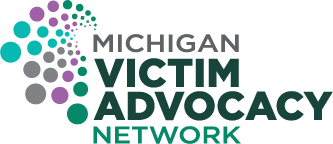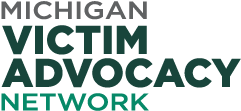10 Top-Tier Resources for Understanding Intersections During Sexual Assault Prevention and Awareness Month 2022
April is sexual assault prevention and awareness month. In recognition, MiVAN has pulled together what we think are ten of the most useful and informative trainings, resources, and articles for advocates who want to better understand sexual violence and intersecting identities.
1. Understanding Male Socialization, Stigma, and Reactions to Sexual Violence
“When it comes to sexual assault, abuse, and harassment, men are taught to not identify as victims. … When a man does want to reach out to ask for help related to his victimization and healing, he may not have the language to understand or talk about what happened. Men may even express an attitude of “no big deal” related to sexual violence.”
2. Gay Latino Sexual Assault Survivors: Best Practices To Supporting Nuestros Hermanos
July 2020
“This two-part webinar from Esperanza United serves as a primer for community stakeholders, advocates, researchers, and service providers who may interface with Latino sexual assault survivors. Participants will be provided with an overview of prior research of sexual violence towards gay men and the LGBT Latinx community, including victimization prevalence rates and known barriers for this population. Topics surrounding Latino masculinities, and heterosexism will be discussed in relation to their influence on gay Latino sexual assault survivors.”
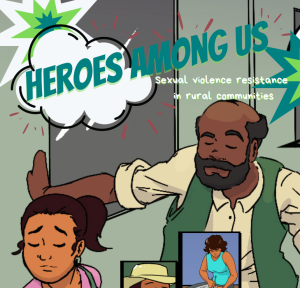 3. Rural LatinX Comic: Sexual Violence Resistance in Rural Communities
3. Rural LatinX Comic: Sexual Violence Resistance in Rural Communities
March 2021
“If you are a sexual violence advocate, social service community partner, activist, etc. you can use this cómic, provided by EVAWI, to start conversations in your community. Read the stories during Sexual Assault Response
Team (SART) meetings & discuss how your community would respond to them. This can help you identify existing gaps in resources and/or build new partnerships to address those. It can help challenge current thinking & rape culture.”
4. Expanding Our Frame: Deepening Our Demands For Safety And Healing For Black Survivors Of Sexual Violence
February 2019
“Expanding Our Frame, Deepening Our Demands from the National Black Women’s Justice Institute calls for an expansion of messaging and responses to more explicitly center the experiences of Black women, girls, trans and gender nonconforming people. The brief highlights ways in which systems advanced as sources of “safety” from sexual violence—including law enforcement, educational settings, social services, and health care provider—often in fact serve as perpetrators of sexual violence against Black women and girls.”
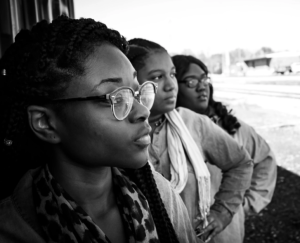 5. Black Women, Sexual Assault, and Criminalization
5. Black Women, Sexual Assault, and Criminalization
April 2021
This article is from the National Black Women’s Justice Institute talks about how “for every Black woman who reports rape, at least 15 do not report. Many survivors do not report their assault for a variety of reasons, including shame, humiliation, fear of retaliation, racism, historical failure of law enforcement to believe and protect Black women, and fear of unjust harm to Black partners.”
6. Safety Planning for Immigrant Survivors of Domestic and Sexual Violence
October 2019
This webinar recording from Esperanza United discusses how “Abusers often use the threat of immigration enforcement as a way to maintain power and control and to make victims less likely to seek protection. For this reason, it is important for advocates to understand how to: help immigrant survivors become aware of their rights; identify immigration remedies for victims, including special VAWA provisions around confidentiality; prepare enhanced safety plans; and increase meaningful access to services.”
7. Sexual Violence Against Older Adults: Responding to and Investigating Cases of Elder Victimization
“This webinar from NSVRC focuses on how victim service providers, law enforcement and prosecutors can engage with older adults who have experienced sexual violence, including adults who are living with neurocognitive disorders.”
This webinar can be found here in their training library
Library is available for viewing with account. Accounts are free to create.
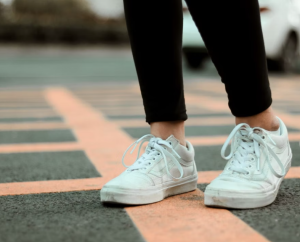 8. Understanding the Nexus of Sexual Violence and the Science of Addiction
8. Understanding the Nexus of Sexual Violence and the Science of Addiction
June 2021
This webinar recording from IAFN discusses how “Drug addiction is a complex disease, and quitting usually takes more than good intentions or a strong will. … Fortunately, researchers know more than ever about how drugs affect the brain. Learning objective: Participants will learn the science of addiction. They will leave with the ability to explain why substance use disorders are a disease of the brain as well as a disability.”
*You must register to view the recording, and registration is free.
9. How Alcohol and Sexual Violence Meet on Campus During a Pandemic
How Alcohol and Sexual Violence Meet on Campus During a Pandemic – Part 1 – July 2021
In this podcast from NSVRC, join us as Dr. Koss gives an overview of sexual violence and alcohol consumption, and she and Dr. Anderson talk about some of the ways prevention efforts can impact young men.
How Alcohol and Sexual Violence Meet on Campus During a Pandemic – Part 2 – August 2021
In this podcast from NSVRC, we continue our conversation with Dr. Elizabeth Anderson, Dr. Elise Lopez, and Dr. Mary Koss. Listen as we talk about the impact of sexual violence on women and how the COVID-19 pandemic has changed the dynamic of sexual violence on campus.
 10. Serving Trans and Non-Binary Survivors of Domestic and Sexual Violence
10. Serving Trans and Non-Binary Survivors of Domestic and Sexual Violence
November 2017-January 2018
“Despite the fact that people who identify as transgender or non-binary experience violence and harassment in every aspect of life at astoundingly high rates, there are still significant gaps in services for these survivors of domestic and sexual violence. This Special Collection supports advocates and agencies seeking to build their capacity to provide accessible and inclusive services to trans and non-binary survivors. … This collection also provides resources for survivors.” Access the full collection here
BONUS: Rape in the Fields: Documentary and Panel Discussion
The Division of Victim Services hosted a viewing of the “Rape in the Fields” documentary in July of 2021. They followed up the viewing with a panel discussion of several field experts to discuss intersectionality, trust building, and possible policy implications.
ABOUT THE DOCUMENTARY
Rape in the Fields (2013): FRONTLINE and Univision partner to tell the story of the hidden price many migrant women working in America’s fields and packing plants pay to stay employed and provide for their families. This investigation is the result of a yearlong reporting effort by veteran FRONTLINE correspondent Lowell Bergman, the Investigative Reporting Program at UC Berkeley, and the Center for Investigative Reporting.
